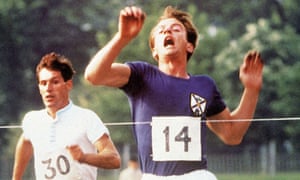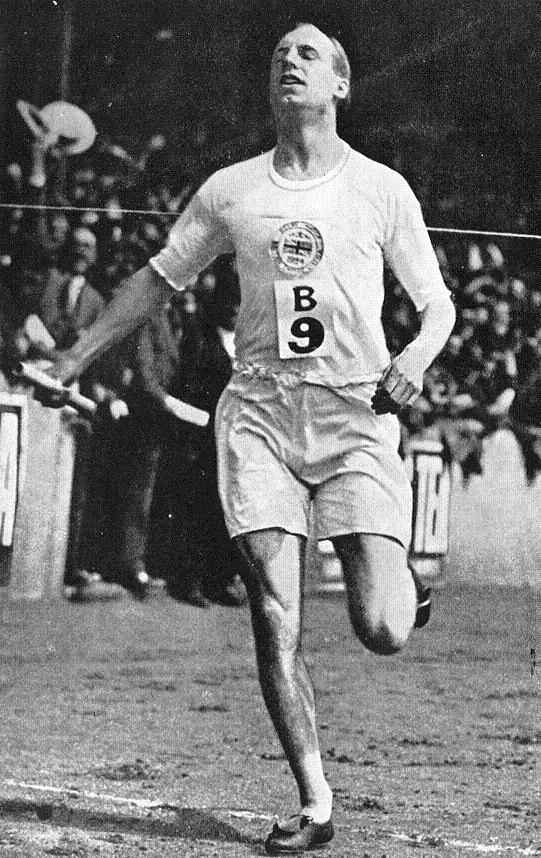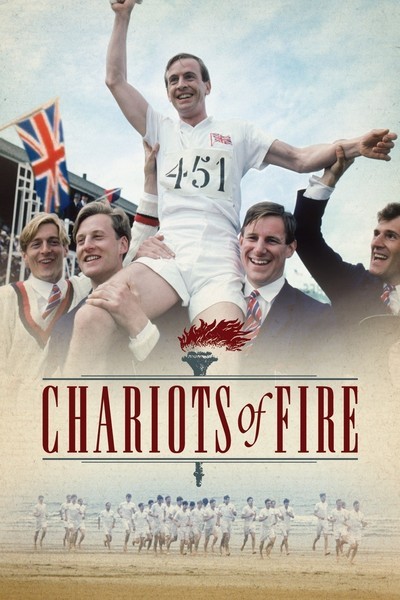CHARIOTS OF FIRE (1981)
I Have Fought the Good Fight. I Have Finished the Race. I Have Kept the Faith...
Chariots of Fire is primarily remembered for one thing: the much-parodied opening sequence of men racing on the beach with Vangelis' stirring theme music urging them on. It would be a terrible disservice if Chariots of Fire is remembered just for that, even if the score is quite iconic now. Chariots of Fire is a much deeper and more moving film of what could have been a mere footnote in history. It is a story of overcoming adversity and keeping true to yourself no matter the pressure. It may fudge some history, but with strong performances to strengthen it, you leave with great respect for the main characters who did great things for themselves and for greater glory.
Chariots of Fire revolves primarily around two men. The first is Harold Abrahams (Ben Cross), who is as British as they come save for two things: he is the son of an immigrant and he is Jewish. Forever with a chip on his shoulder, eager for a fight yet devoted to all things British (especially his beloved Gilbert & Sullivan), Abrahams feels he has to fight twice as hard to get what he wants.
What he wants is a gold medal in the upcoming Paris Olympics of 1924. He also wants to be the fastest man in Britain. However, there is another man who has an equal if not better claim to that title.
It is Eric Liddell (Ian Charleson), nicknamed 'the Flying Scotsman'. Born in China to missionary parents, Liddell is passionate about his Christian faith, using his running skills as a way to talk to others about Christ. His passion for running doesn't sit well with his sister Jennie (Cheryl Campbell), who thinks it is taking too much time away from faith and that Eric is being worshiped himself.
 Harold checks out the competition and knows that Eric is formidable. He is more downhearted when, in their first head-to-head race, Abrahams loses. Harold is shocked and almost bereft. Not even the encouragement of his girlfriend, theater actress Sybil Gordon (Alice Krieg) can seem to lift him.
Harold checks out the competition and knows that Eric is formidable. He is more downhearted when, in their first head-to-head race, Abrahams loses. Harold is shocked and almost bereft. Not even the encouragement of his girlfriend, theater actress Sybil Gordon (Alice Krieg) can seem to lift him."If I can't win, I won't run," he almost tearfully declares.
"If you don't run, you can't win," she retorts.
Abrahams decides to go all-in, hiring professional coach Sam Mussabini (Ian Holm) to train him. While technically not illegal, a professional coach is frowned upon by the English elites who feel it is not 'pure amateur'. Abrahams by this point does not care.
Liddell for his part finds a crisis of his own. Both Abrahams and Liddell, along with Lord Andrew Lindsay (Nigel Havers) and Abrahams best friend, the naive Aubrey Montague (Nicholas Farrell) will represent Britain in the Paris Games. To Liddell's horror, he learns that the qualifying heats for his race will be on a Sunday. As a devout Christian, he will not break the Sabbath. As a runner, he is near desperate to run.
After some personal struggle, Liddell makes his choice: he will not break the Sabbath. Not even pressure from the then-Prince of Wales (later the Duke of Windsor) will have him break. Fortunately, Lord Lindsay comes to the rescue, offering to swap races given Lindsay has already won a silver and is satisfied with that.
Now, the races truly begin. Will Liddell be able to muster the endurance for a race he normally would not run? Will Abrahams finally achieve his goal to win for himself and his people? Will either be able to stand up against the formidable American track team led by legendary athletes Charles Paddock (Dennis Christopher) and Jackson Scholz (Ben Davis)?
Chariots of Fire is known for the Oscar-winning score, particularly its opening theme that even those who have never seen the movie would instantly recognize. They would also know the scene it is connected to: a group of men on the beach running. That one scene and its music is so engraved into popular culture that it is ripe for spoofs and parodies, no less than in the 2012 London Olympics with Mr. Bean having a crack at it.
If the opening scene and music is the only thing one knows about Chariots of Fire, it is a terrible disservice to both the film and viewers as Chariots of Fire is more than either. It is a story about two men, each who faced great adversity and triumphed with grace and courage.
Both Abrahams and Liddell had their own personal struggles, which curiously were connected to their separate faiths. One was blocked from society because of his faith, one found himself blocked from his dream because of it. The film tackles the internal and external issues they faced.
For Abrahams, it was always a fierce determination to be the best, to not let the haughtiness and exclusivity of the WASP establishment stop him. For Liddell, it was to remain true to himself despite pressures by that same establishment to break the faith. Abrahams is an Englishman through and through yet is an alien. Liddell is a Scotsman but also an alien, his loyalty to his God marking him out as a fanatic.
Chariots of Fire in short is more than about racing. It's about being yourself whatever the cost may be. Harold Abrahams and Eric Liddell, different in so many ways, are also very similar. Their personal courage, their own brand of nobility, their obstinacy shaped them and made them truly heroic.
 Our two leads, shamefully overlooked at the Academy Awards that gave the film four wins from seven nods, do absolutely fantastic work. While I would argue the focus is more on Abrahams than on Liddell, both had excellent moments and gave rich performances. Cross' Abrahams was a live-wire when roused to righteous fury, but he also brought a vulnerability with his scenes with Krieg as his love interest, the grand dame of the theater.
Our two leads, shamefully overlooked at the Academy Awards that gave the film four wins from seven nods, do absolutely fantastic work. While I would argue the focus is more on Abrahams than on Liddell, both had excellent moments and gave rich performances. Cross' Abrahams was a live-wire when roused to righteous fury, but he also brought a vulnerability with his scenes with Krieg as his love interest, the grand dame of the theater.In his single-mindedness, in his arrogance, Cross makes Abrahams into almost an impenetrable fortress. However, when he is coming to his final race, his final chance for that glory he so desperately seeks, for that validation for himself and for the nation he embraces yet which does not fully embrace him, Cross shows the genuine fear and pain that Abrahams only now permits himself to show.
It is a marvelous and moving performance.
That easily describes Charleson, taken far too soon from us. As Liddell, Charleson makes his faith not a stumbling block or some crazed obsession, but a quiet, gentle light within. Some of his monologues, such as when he speaks in the rain to a group that has just seen him win a race or when trying to explain to his doubting sister that when he runs, he feels God's pleasure, are moments of quiet grace and elegance. You see his own obstinacy when refusing to run on the Sabbath, yet it is not arrogance but steely determination to honor his God.
Charleson makes Eric Liddell a modern-day Daniel, keeping the faith while within the lion's den. You leave the film admiring his courage to stand still for his principles. You leave the film admiring Harold Abrahams for his determination to get what he goes after.
The film also has smaller yet impressive work from Krieg as the loving, loyal yet strained Sybil, Havers and Farrell as the other runners (both of whom know Abrahams) and especially Holm as the cantankerous yet loving Sam, who sees something in Abrahams that is worth molding. Chariots of Fire also has essentially cameos from Sir John Gielgud, Lindsay Anderson and Nigel Davenport.
While Christopher and Davis were the 'requisite American stars', they did well in their small roles, more Davis than Christopher since he had a larger role.
Chariots of Fire is a very moving and inspirational film about two extraordinary men. There are quibbles to be had: the film has a flashback within a flashback and the makeup work on Havers in the present-day scene was horrible. It might also stray far from actual history, but in this case I would say that these are minor details to a film that is more than just its brilliant music.
Eric Liddell is asked as he watches the race he would have been in and wanted to be in if he had regrets. "Regrets, yes. But no doubts". Would that we all live with such faith.
If we did, we too would see our strength renewed. We shall run and not be weary, we shall walk and not faint...
 |
| Harold Abrahams: 1899-1978 |
 |
| Eric Liddell: 1902-1945 |
DECISION: A-
1982 Best Picture Winner: Gandhi


No comments:
Post a Comment
Views are always welcome, but I would ask that no vulgarity be used. Any posts that contain foul language or are bigoted in any way will not be posted.
Thank you.